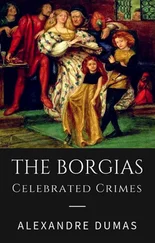In his weakened state, lying in bed in his rooms above the Borgia apartments in the Vatican, Cesare had been uncharacteristically hesitant during the first few days of the sede vacante . Now, in an attempt to make up for lost time, he started to make overtures at the same time to both French and Spanish candidates in the conclave, offending both factions when his behaviour became known. He had also been able to come to a secret agreement with Louis XII whereby he agreed to place all his men at the king’s disposal on the understanding that Louis XII would protect the territories that Cesare still occupied and help him to recover those that had recently been lost.
He also swore his allegiance to the college of cardinals, and a few days later, a deputation of cardinals approached the Venetian ambassador, Antonio Giustinian, with a request that he should use his persuasive skills to induce Cesare to remove his troops from Rome so that a free conclave could be held. Since, as Giustinian put it, this was no business of his and he had no instructions from Venice in the matter, he, at first, declined. Under pressure, however, and persuaded that his actions would bring great credit to his government, the ambassador did, in the end, convince Cesare. And so, on September 2, having been confirmed by the college in his position as captain-general of the church until the election of a new pope, and having been informed that the soldiers of Prospero Colonna had indeed left the city, as he had requested, Cesare finally left for the castle at Nepi.
Cesare, too weak to ride, was carried out of the city on a litter borne by twelve halberdiers, concealed from view behind crimson damask curtains. Those who caught glimpses of him at this time reported him as looking desperately ill, pale, and haggard, his feet so swollen that he could not stand up. Following the litter walked a splendid charger with trappings of black velvet, embroidered with his coat-of-arms and his ducal crown. According to Ferdinand Gregorovius, Cesare was also accompanied by his mother, Vannozza de’ Catanei, and by his brother Jofrè, as well as more than one hundred wagons piled high with his luggage. ‘Now that Cesare has gone,’ Antonio Giustinian commented, ‘it is thought that the conclave will take place without any disturbance, since everyone respects the Sacred College.’
The college, meanwhile, had been busy organizing the obsequies for the dead pope, which opened on September 4 with the first of the memorial Masses for his soul. They continued every day at the catafalque that had been erected in St Peter’s for the following eight days. These obsequies, however, were of scant interest compared with the heated discussions about the outcome of the imminent election. Many believed that the next pope might be Ascanio Sforza or the Frenchman Georges d’Amboise, cardinal of Rouen. But most supposed that Giuliano della Rovere, after ten years in exile, would be chosen; on his arrival in Rome in the hope that his long-held ambition to be elected was about to be fulfilled, he had told Giustinian, succinctly, ‘I have come to Rome to look after my own interests and not those of other people.’
When the conclave finally opened on September 16, with thirty-seven cardinals in attendance, it was soon clear that the cardinal of Rouen could not win the tiara; both the Italians and Spaniards were against him, and in order to break the deadlock caused by rival national interests and by fears that Cesare Borgia might recover sufficiently from his illness to interfere in the election, the search turned to a compromise candidate, one who was not expected to survive for long and who would provide a temporary measure allowing all parties to build up support for a candidate of their own. Their choice consequently fell upon Francesco Todeschini Piccolomini, archbishop of Siena, the kindly nephew of Pius II, who was racked by gout and already gave the appearance of a very old man, despite being only sixty-four years old. When he was elected, on September 22, he chose to be known as Pius III, in honour of his uncle.
Pius III was a learned and cultured man, a protégé of his uncle, who had taken him into his household and arranged for him to attend courses in legal studies at Perugia. At the age of twenty-one, he had become, again at his uncle’s instigation, archbishop of Siena and soon afterward cardinal of Sant’Eustachio. For Cesare, everything now hinged on whether he would enjoy the favour of this man, his father’s successor.
The enforced convalescence at Nepi had by now almost restored Cesare to his previous good health, though he was careful to ensure that reports of his worsening condition continued to circulate in Rome. And his spirits rose when he was given grounds to believe that he would soon be confirmed in his office as captain-general of the church by the new pope and returned to authority in his former estates in the Romagna. Certainly, Pius III seemed prepared to condone the indulgence of Cesare’s ambitions, declaring that it had been God’s will that those lords whom Cesare had dispossessed should lose their authority, even though it had been carried out by a ‘wretched instrument.’
‘In consequence of the pressure put upon me by the Spanish cardinals, I have been compelled to issue some briefs in favour of Cesare Borgia,’ he explained to Giustinian, ‘but I will not give him any further help.’ Pius III’s opinion of his predecessor’s son was not encouraging: ‘I do not wish any harm to the Duke, since it is my duty as Pope to have compassion for all men, but I foresee that, by God’s judgement, the Duke must come to a bad end.’ Giustinian reported that ‘the Duke has had good words from the Pope,’ adding later, ‘But His Holiness does not trust him.’
Cesare now decided to return to Rome, where he hoped to be able to press Pius III to confirm him in his offices of captain general of the church and Duke of Romagna. He needed papal permission, however, to enter the city and ordered the Spanish cardinals to plead his case. ‘They tell me he is very ill,’ Pius III informed the Ferrarese envoy Beltrando Costabili, who reported that the pope had never imagined he would feel pity for Cesare but did now ‘indeed most deeply pity him,’ adding that ‘he wants to come to Rome to die, so I have given my permission.’ Much to the surprise of all in Rome, when Cesare returned on October 3, he seemed to be in the best of health.
A few days later Giustinian reported that Cesare was ‘not so ill as we all believed,’ and, moreover, ‘now speaks with his customary arrogance and boasts that he will soon regain possession of all his states.’ The ruse had worked, though, and on October 8, the day of his coronation, Pius III confirmed Cesare as captain-general of the church. Such was the pope’s ill health, however, that the customary procession from St Peter’s to San Giovanni in Laterano had to be cancelled; Pius III was suffering so painfully from gout that he was unable to undertake this lengthy ceremony and retired to his apartments in the Vatican, where, ten days later, he died.
Cesare had spent those ten days making preparations to return with his army to the Romagna, where his grasp was weakening as each day passed, and seeking to acquire the safe-conduct passes needed to move his troops through Florentine territories. But Cesare, still obliged to spend much time in bed, and seemingly disturbed in mind as well as sick in body, was now apparently incapable of acting as decisively as he had been in the past; and when he did make decisions, they were not infrequently the wrong ones. His decision to come to Rome after the election of Pius III, rather than travel directly from Nepi to the Romagna, would prove to be one of these.
In the meantime, however, his plans soon had to be modified as his enemies Cardinal della Rovere and Cardinal Raffaello Riario, Gianpaolo Baglioni and Giovanni Bentivoglio, and the Orsini and the Colonna families, still in uneasy alliance, all began to move, one after the other, against him. Not only threatened by his enemies, Cesare was also troubled by a mutiny of his own soldiers, who were demanding better pay; then he became involved in a ferocious fight with Orsini supporters and, deserted by many of his men, was forced to take shelter first in the Vatican, then in Castel Sant’Angelo.
Читать дальше











